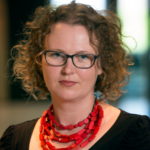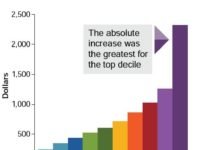The Australian debate on the forces, trends and responses to inequality continue, with the release of the Productivity Commission’s report Rising inequality? A Stocktake of the evidence. Responses to the report from across the political spectrum have been predictable, given that the report notes only a slightly worsening of Australian inequality over the last 30 years.
Addressing the National Press Club on 28 August about the report, Productivity Commission Chair Peter Harris emphasised how persistent disadvantage is an important public policy issue:
“Making a commitment to a comprehensive policy response to persistent disadvantage matters not just because we ought to be able to do better by our fellow Australians as we look out at a fourth decade of uninterrupted economic growth.”
The Report (p.8) is very explicit:
“About 9 per cent of Australians (2.2 million people) experienced relative income poverty (income below 50 per cent of the median) …. This aggregate figure has fluctuated … but, despite 27 years of uninterrupted growth, has not declined. Persistent and recurrent poverty affects a small, but significant proportion of the population…. People living in single‑parent families, unemployed people, people with disabilities and Indigenous Australians are particularly likely to experience income poverty, deprivation and social exclusion.”
Simon Cowan (Centre for Independent Studies) writes: “The evidence in its report suggests inequality should be a second-order issue here. Given Australia is in the top-10 most-equal societies in the OECD, inequality should be less important than poverty and disadvantage.”
The report stimulated extensive debate in The Guardian Australia, The Age, The Mandarin, Crikey and elsewhere. “Don’t believe what they say about inequality. Some of us are worse off,” writes Professor Peter Whiteford in The Conversation.
Community Council for Australia CEO David Crosbie comments about the role of not-for-profit organisations writes:
“One of the core roles of many charities is to address underlying inequality, to create opportunities where none exist, to encourage participation where isolation dominates, to break cycles of poverty and disadvantage, to build compassion and understanding so that we share in the success of our neighbours rather than seeing them as a threat.”

What Community Colleges Australia is doing – Our Conference
“It's clear that how Australian society and politics addresses the issue of inequality and disadvantage is very much live. CCA’s members have much to contribute to assisting the vulnerable and disadvantaged groups identified by the report. CCA has made presentations about how Australia’s adult and community education sector deals with inequality,” said Dr Don Perlgut, CCA CEO.
“CCA’s November 2018 Conference – unfolding in Sydney on November 14th and 15th – will have a strong focus on what inequality means for community education providers, and Australia’s VET sector generally,” said Dr Perlgut.

Professor Richard Holden, Academic Co-Lead of the UNSW Grand Challenge on Inequality, will speak at the Conference on the importance of education in addressing inequality.
Watch Professor Holden speak on “How to redistribute capital, mitigating inequality without killing productivity” on YouTube (see below).

Edwina MacDonald, Director of Policy and Advocacy at ACOSS, will speak at the Conference on “Achieving social and economic justice in Australia: The role of not-for-profit community organisations”, and will review the ACOSS Inequality in Australia July report.
CCA invites all interested in how not-for-profit educational organisations address this issue to join us in November.





